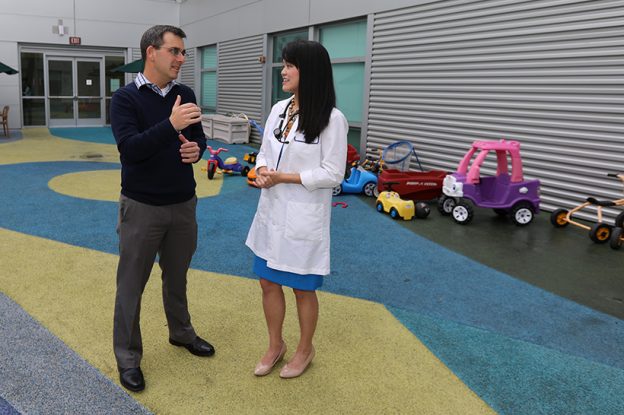
Resident research improves patient care
Over recent years, patient care at Kaiser Permanente Southern California has improved in many ways due to what might be considered an unlikely source: our residents’ research.
In the Pediatrics Department at the Kaiser Permanente Los Angeles Medical Center, resident research has led to better booking of follow-up appointments and fewer unexpected intubations among newborns. It also found that flu vaccinations significantly reduce pediatric hospitalizations for asthma and other respiratory issues.
“Our graduate medical education research program provides a real-life world for a resident to experience research that is much more practical than in many places and can set them up for a strong future career,” said Joshua May, MD, a pediatric endocrinologist at the Los Angeles Medical Center and the associate program director of the pediatric residency program. “I think wherever our residents go, whether they open a practice or stay with Kaiser Permanente, they will take with them the concept of being a doctor who is always aware of areas of improvement and looking at how they can make things better.”
At Kaiser Permanente, physician and scientist research is continually improving the quality of care to patients and the community. Medical residents add to this learning cycle by using their fresh eyes to spot potential improvements, conducting research, and often presenting that work to physicians and even the wider medical world at conferences and through publications.
The group that oversees medical residencies in the United States, the Accreditation Council for Graduate Medical Education, requires residents to engage in scholarly activity during their education. The activity can vary greatly from resident to resident and program to program.
Kaiser Permanente Southern California formalized its research program for residents 5 years ago when it hired 2 people to oversee the program. The aim was to provide some structure and programming for research during residencies. At any given time, there are about 400 residents and fellows in the program.
Kristen R. Ironside, MA, the research program manager for graduate medical education at Los Angeles Medical Center, says she believes they’ve “started to shift the culture of research within the residency space.”
“We spent a lot of time training faculty who are now research champions within their departments,” she said. “We’ve given them the confidence to do research projects and to teach, and by doing so, we’ve created new pathways for research.”
At the Los Angeles Medical Center, pediatric resident Jacqueline Nguyen, MD, wanted to know how flu shots affected young patients with asthma. She dug into data from electronic health records and found that flu vaccination reduced hospitalization rates for respiratory issues by 25.1% in the past 6 years.
“Residency research allowed me to investigate questions that I wanted to answer,” Nguyen said, “especially during flu season, when many families are skeptical about benefits of flu vaccination.”
Dr. Nguyen’s residency ends in June. She plans to become an outpatient general pediatrician with an emphasis on urgent care. She said one of the moments she will never forget from her residency was when she received her preliminary data results.
“It made me realize the sheer impact and wealth of information that Kaiser Permanente has to draw upon,” she said. “Other memorable moments included how my mentors, attendings, and colleagues reacted to my results, and I understood how significant they were because they were so applicable to our daily practice.”
Through February 28, Kaiser Permanente Southern California faculty, residents, and fellows can apply to the 18-month Regional Research Committee-Graduate Medical Education Research Mentorship program. Contact Davida.Becker@kp.org or Kristen.R.Ironside@kp.org with questions.





